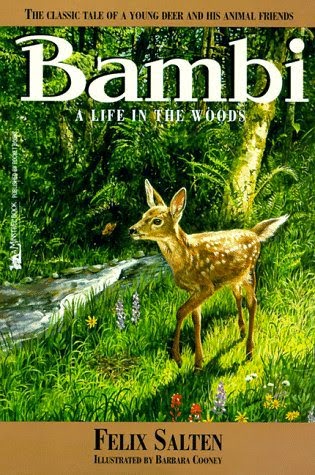Bambi is the life study of a forest deer who begins his life under the care of his doting mother, happy and carefree, and surrounded by the other forest animals.
One day his mother disappears for a while and for the first time he finds himself alone. He wanders around troubled and in despair. In his misery be begins to call for her when suddenly, one of the father deer appears in front of him, proud and powerful.
"What are you crying about?" the old stag asked severely...
"Can't you stay by yourself? Shame on you!"
He is the old Prince, the biggest stag in the forest.
Before the younger deer could reply, the old stag disappears but Bambi is awed by the encounter. After this the great Prince is never far from his thoughts and Bambi longs to win his approval.
One day Bambi learns that danger lurks in the forest.
"What is it, Mother?" he asked. "What is it, Mother?"
His mother answered between gasps, "It - was - He!"
Bambi begins to learn about Man. The forest animals say He is all powerful. He kills what He wants and nothing can stop Him.
The old stag returns and visits Bambi from time to time. He teaches him wisdom and shows him how to preserve himself. He watches over Bambi and saves his life when he is wounded by Him.
Then comes the day when the old stag gives Bambi his final lesson. Following a terrifying scent, the old stag leads Bambi to where a poacher lies dead upon the ground.
"Do you see, Bambi," the old stag went on, "do you see how He's lying there dead, like all of us? He isn't all-powerful as they say. Everything that lives and grows doesn't come from Him...
He has the same fears, the same needs, and suffers in the same way...
Do you understand me, Bambi?"
Bambi was inspired, and said trembling, "There is Another who is over us all, over us and over Him."
Bambi is a gem, delicately and poetically written. As with some other notable children's classics (Pinocchio, Jungle Book and Grimm's Fairy Tales, for example) the original book has been adapted to death, condensed, sanitised, swallowed up and presented as a movie that misses the real story. We know all about Bambi, Pinocchio, Mowgli and Snow White but we have not met them personally.
Felix Salten was the pseudonym of Austrian author and critic, Siegmund Saltzman. Born in Budapest, he lived in Vienna but settled in Switzerland after fleeing from the Nazis. He originally wrote Bambi in German in 1923 and in 1928 Simon & Schuster published the first English edition. This edition has a forward written by novelist and playwright John Galsworthy, who describes the story as 'delicious,' and, 'a little masterpiece.'
Bambi is scheduled as a free read in the
Ambleside Online Year 4 curriculum.
Updated to add: the original book is online
here.
This book is part of my reading for Back to the Classics 2015 (a
Children's Classic),
The Classics Club and the
2015 Classic Children's Literature Event.











